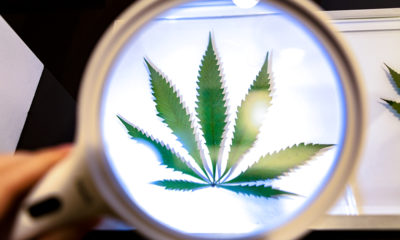
Medical
Cannabis Holds the Key to Weight Loss
New findings cuts against both the stereotypical image of the munchies-craving stoner and well-known research showing cannabis stimulates appetite.
I weighed 308 lbs. at my peak when I moved to Washington, D.C. in early 2009 to cover the White House. A decade of inattention had taken its toll. I was part of an American obesity epidemic estimated by the Centers for Disease Control to affect over one-third of American adults and had reached a cost of $147 billion annually by 2008.
One afternoon not long into my new beat, I returned home with nothing interesting to write. There hadn’t been any obvious story out of the day’s events that fit our brand. After an hour of growing panic, I still had nothing, and didn’t know what to do. So I smoked some pot.
I’d tried cannabis a handful of times in my life in social situations – mostly two decades prior while in college – but I’d since avoided it because it primarily made me feel socially awkward and uncomfortably self-conscious. However, this time was different: a creativity switch flipped, I had a new idea, and the words flowed. After the effect had passed, I reviewed what had felt good coming out just to make sure. It held up. I posted the piece. My relationship with cannabis had begun. Although I didn’t know it at the time, so had my physical transformation.
Three weeks ago, university researchers at Cornell and San Diego State released a new study based on decades of data that confirms a counterintuitive finding: states that have legalized cannabis have seen a 2 percent to 6 percent decrease in the likelihood of obesity. Moreover, say the researchers, this effect may grow over time and provide dramatic social cost benefits. According to the authors, “we estimate a back-of-the-envelope, per-person reduction in [medical marijuana law]-induced, obesity-related medical costs of $58 to $115 per year.”
There are caveats. Some states have legalized cannabis much more recently than 1990. The study’s researchers used data that included over 5 million individual survey responses collected by the federal Behavioral Risk Factor Surveillance System (BRFSS) between 1990 and 2012, so one critique is that some of the data is more scant in more recently legalizing states. Another is that the BRFSS is good at measuring risk across states, but may be less effective in capturing state-specific effects than would a more state-tailored survey.
Still, the counterintuitive finding cuts against both the stereotypical image of the munchies-craving stoner and well-known research showing cannabis stimulates appetite. To explain their results, the authors suggest that in legalized states, older adults have been using cannabis as medicine, which allows them to overcome chronic pain to become more active and burn more calories. In addition, they say, younger recreational users seem to be consuming fewer calories by substituting cannabis for alcohol in general and binge drinking specifically.
Jim McAlpine, founder of the growing 420 Games, says he’s not surprised by such findings. Three years ago, Jim lost 60 lbs. and “cannabis was the main way I did it.” He said he’s not surprised by the findings, saying cannabis “helped motivate me to work out and also helped curb my appetite.”
McAlpine stressed perspective, noting that “when you look at active people, they tend to use cannabis in a more positive way than inactive people.”
Other studies have shown a link between lower obesity rates and cannabis use. When researchers studied the adult Inuit population, whose cannabis usage rate exceeds 57 percent, they found that users of cannabis had lower BMI and lower body fat percentage than similarly situated non-users.
Canadian mice also seem to concur. Earlier this month, Canadian researchers found chronic THC intake in mice prevented diet-induced weight gain and obesity. Additionally, a 2011 study showed cannabis users of at least three times per week were less likely than non-users to be obese by approximately one-third.
Such findings do not surprise me, because after I integrated cannabis into daily exercise I lost 113 lbs.
As I smoked more frequently, I consumed less alcohol. I found more enjoyment in walks and general activity. As my momentum gathered steam, I exercised more vigorously. Pot helped with sore muscles. It relaxed my breath during exercise. I became more conscious of what I ate. I found greater pleasure in every exercise whether yoga or long hikes or high-intensity interval training.
These are exciting times for discovering health benefits to cannabis use. As McAlpine enthused, “The more science and research behind” our mutually-experienced empirical results, the more the health industry will be able to “use data to help find the best ways to use cannabis for weight loss. It sure worked for me.”
Do you use cannabis to help manage your weight? Tell us about your experiences in the comments below.
To read more about Cannabis and Weight loss order the newest issue of Cannabis Now.
























